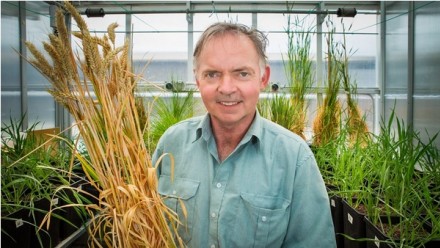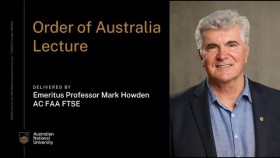Distinguished Professor Graham Farquhar wins Prime Minister's Science Prize for work on climate change
The ANU congratulates Distinguished Professor Graham Farquhar AO, who has won the 2015 Prime Minister's Prize for Science for his work on water-efficient crops and to help the world understand the impacts of climate change.
ANU Vice-Chancellor Professor Ian Young AO said Professor Farquhar was a global leader in plant biophysics and photosynthesis.
"The Prime Minister's Prize for Science is well-deserved recognition for Professor Farquhar's career at ANU, which has focussed on finding real and practical solutions to the problems facing the world," Professor Young said.
"He has helped develop new water-efficient varieties of wheat, improved global food security, and found evaporation and winds speeds are slowing as the climate changes.
"On behalf of the University, I congratulate Professor Farquhar and his colleagues on the latest award, and wish them continued success in the challenging field of plant science and photosynthesis."
Professor Farquhar said the award was recognition of the great work being done by teams of plant scientists at ANU.
"It's a great honour," Professor Farquhar said. "It is recognition of work I've been part of at ANU now on and off since about 1970."
The Prime Minister's prize is the latest in a string of accolades for Professor Farquhar.
In 2014, he won Britain's prestigious Rank Prize with CSIRO colleague Dr Richard Richards for developing a new variety of wheat, Drysdale, which provides higher yields with less water.
He was appointed an Officer in the Order of Australia (AO) in 2013, and won the 2016 Australian Academy of Science Macfarlane Burnett Medal and Lecture. He was appointed a Life member of the Australian Society of Plant Scientists in 2015, and shared the Nobel Prize in 2007 with other members of the United Nations Intergovernmental Panel on Climate Change.
Professor Farquhar was appointed a Distinguished Professor at the ANU Research School of Biology in 2004, and he is a Chief Investigator at the Australian Research Council Centre of Excellence for Translational Photosynthesis, which is based at ANU.
He also leads a collaboration between ANU, University of Western Sydney and the CSIRO on Forests for the Future: making the most of a high CO2 world, funded by the Science and Industry Endowment Fund.
His latest research is looking at how plants will cope with climate change and higher levels of carbon dioxide in the atmosphere, and which plants will grow best in drier marginal farm lands.
Professor Farquhar first came to ANU as an undergraduate, completing his Bachelor of Science in 1968. He returned to the University to complete his PhD in Environmental Biology in 1973.
He praised his colleagues and the ANU for its support throughout his career.
"The ANU has been my home for some time. I was attracted here as a scientist as it was the best place in the world to do plant science," he said.
"ANU has had the best personnel in the areas of science I'm most interested - plant physiology, photosynthesis and water use. That combination has meant ANU is the best place in the world to work on plant physiology that deals with plant growth, water use and photosynthesis.
"I've benefitted from that combination of top people and top facilities."











